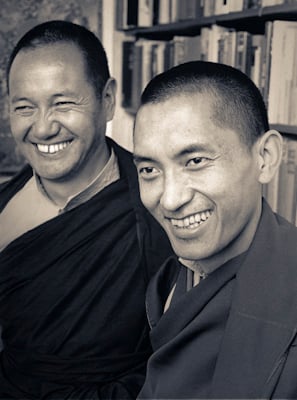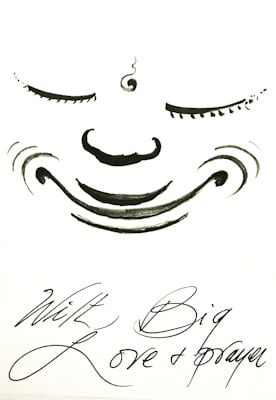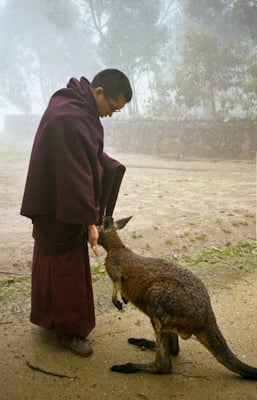Dear LYWA friends and supporters,
Thank you so much for reading our monthly e-letter. We truly appreciate your interest and support. Please share it with others.
2012: Our Biggest Year Ever
It's hard to believe that 2011 has almost come to a close. The end of the year is when we really come to you for help. It's a most important time for the Archive because this is when we need to raise the funds to carry us into the new year so that we can continue spreading the Dharma for the sake of all sentient beings. And we have a big year of spreading the Dharma coming up. Perhaps our biggest ever.
And we have a big year of spreading the Dharma coming up. Perhaps our biggest ever.
Over the past few years we have been doing a lot of editing work that has not yet seen the light of day but many of these projects are set to come to fruition in 2012.
Our new Heart Advice Series will see its first book, Rinpoche's Bodhisattva Attitude. This project met with some unexpected delays but the finishing touches on it are being made now. The next book in this series will be Rinpoche's heart advice on refuge.
We expect to publish at least three books from our Publishing the FPMT Lineage project: Lama Zopa Rinpoche's How to Practice Dharma: Teachings on the Eight Worldly Dharmas; The Perfect Human Rebirth; and Good Life, Better Death: Teachings on Impermanence. There are several other books from this series well down the pipeline too: Rinpoche's teachings on the three lower realms, refuge and karma.
A new Lama Yeshe tantric commentary is also planned: Lama's teachings on Gyalwa Gyatso.
In addition, we will be reprinting Lama Zopa Rinpoche's Virtue & Reality and putting out a revised edition of our collection of guidance from great lamas, Teachings from Tibet.
And finally, we hope at last to publish our major work, Adele Hulse's biography of Lama Yeshe, Big Love. Adele spent eighteen years compiling this book and we have spent over three years editing it, collecting and preparing the hundreds of photographs that it will contain and doing all the other things that the definitive Lama Yeshe biography deserves.
So by supporting the Archive with your generous year-end donation you are supporting the publication of these books and many, many more. Thank you so much.
Note that we are offering a special gift for donors of $250 or more: we will send you an 8x10 archival photo of your choice, professionally printed and matted in an 11x14 mat. Check out the choices in this special gallery.
The Benefits of Being a Benefactor or Member
A Benefactor is "one who does good." Your donation enables the Archive to continue our work of preserving, editing and publishing the teachings of Lama Yeshe and Lama Zopa Rinpoche, and other great teachers of our time. Become a Benefactor with your donation of $25 or more and you will automatically receive all new free publications for one year. This includes the books due to be published in the Heart Advice series mentioned above, like Bodhisattva Attitude.
You can also become a Member with your donation of $1,000 or more. This can be donated all at once, or over time with monthly or quarterly donations. Once a Member, always a Member, meaning you will automatically receive all new LYWA publications for as long as we are in existence.
 There's never been a better time to become a Member. We are soon going to make available in our Members Area the entire LYWA library in digital format, which our Members will be able to freely download. All of our books will be available in pdf and other e-reader formats; there will be links to our full-length DVDs on YouTube; and there will be a gallery or selected images that Members can download in high-quality format to print on their own.
There's never been a better time to become a Member. We are soon going to make available in our Members Area the entire LYWA library in digital format, which our Members will be able to freely download. All of our books will be available in pdf and other e-reader formats; there will be links to our full-length DVDs on YouTube; and there will be a gallery or selected images that Members can download in high-quality format to print on their own.
If you are already a Member, give the gift of dharma this holiday season to a loved one. Purchase one of our new Gift Certificates and the recipient can use it for anything on our website, including books, DVDs, shipping costs, and Memberships. You can also make arrangements with our office to pay for a Membership on behalf of someone else.
What's New On Our Website
On the heels of the Thanksgiving holiday, we have just posted a teaching from Rinpoche on the benefits of saving the lives of animals. An excerpt from this teaching is our monthly e-letter feature which you can read below.
Listen Online to teachings given by Rinpoche in 1979 in Cumbria, England at Manjushri Institute. These introductory lamrim teachings focus on perfect human rebirth and bodhicitta.
Among the new advices posted in Rinpoche's Online advice book: advice on how to generate faith, and many new practice advices, including advice on preliminary practices and daily practices, such as how to make sleep a Dharma practice. There is also a general practice advice where Rinpoche tells a few anecdotes about his life.
In all there were 13 new advices posted to the Advice book. You can see a list of all the new postings here.
Other Updates
The latest updates regarding Rinpoche's recovery from his stroke are very positive. Rinpoche has been in France and India focusing on his health. Ven. Roger reports that one of Rinpoche favorite exercises is playing soccer! Remember you can always see the FPMT website for the latest updates on Rinpoche's health.
Thanks for responding to our request to friend us on FaceBook. There are now over 4,000 of you receiving our page updates. Spread the word!
Thank you again for your kindness and generosity. Please help LYWA’s 2012 be our best year yet!
Much love,
Nick Ribush
Director
This Month's Teaching: Liberating Animals
 Saving the lives of others is one of the incredible holy deeds of a bodhisattva, and this practice is done not just from time to time but all the time. This gives many thousands and thousands of people the opportunity to engage in this virtuous action that has inconceivable benefits, as mentioned in the Sutra Requested by [Lodro] Gyatso.
Saving the lives of others is one of the incredible holy deeds of a bodhisattva, and this practice is done not just from time to time but all the time. This gives many thousands and thousands of people the opportunity to engage in this virtuous action that has inconceivable benefits, as mentioned in the Sutra Requested by [Lodro] Gyatso.
Now here I would like to mention something about the importance of this practice. We are liberating thousands of fish, chickens and other creatures. Now, for every one of us here, every single one of these creatures is the source of all our past, present and future happiness. All the happiness we have experienced numberless times in the past, during our beginningless samsara, has been received by their kindness. It is the same with all our present happiness and comfort, even the comfort we feel when cool air passes over us when we are hot or the comfort of a pleasant dream. We receive all our present happiness by the kindness of all these sentient beings. And we will receive all our future happiness by their kindness. So, they are the most precious, most kind beings.
On top of all the happiness of samsara and all the future happiness, we receive the ultimate happiness of liberation from samsara by the kindness of all these creatures that we’re liberating today. By this, these sentient beings now become even more kind, more precious, to us.
On top of that, we achieve enlightenment, or great liberation, the state of completion of all the qualities of cessation and of completion of all realizations by the kindness of each and every single one of these sentient beings. For us, they are now even more precious and unbelievably kind.
I need to explain the logic behind how we receive every single happiness—all our past, present and future happiness; liberation; and enlightenment—by their kindness.
All your happiness comes from your virtuous action, your virtuous thought. Every single happiness, whether temporary happiness or the ultimate happiness of enlightenment, comes from your mind, from your virtuous thought and virtuous action. So, your virtuous thought or virtuous action is the action of buddha. There are two actions of a buddha: one is within us sentient beings and the other is possessed by the buddhas themselves.
Now, one’s own good karma, one’s own virtuous thought or action, came from Buddha. Since this is Buddha’s action, it came from Buddha. Buddha came from bodhisattva; bodhisattva came from bodhicitta; bodhicitta came from great compassion; and great compassion is generated in dependence upon the existence of obscured, suffering sentient beings. So, great compassion is generated in dependence upon the kindness of each and every single one of the numberless obscured, suffering sentient beings. Great compassion is generated in dependence upon each and every single obscured, suffering sentient being.
Therefore, you can now see that every one of us receives all the past happiness we have experienced during beginningless rebirths, all our present happiness and all our future happiness, including the ultimate happiness of liberation from samsara and full enlightenment, by the kindness of each and every single obscured, suffering sentient being.
Therefore, every one of us here receives all our past, present and future happiness up to enlightenment, including every realization of the path, by the kindness of each and every single one of these creatures. We have received everything from each chicken, each fish or each of the other animals. We can now see that they are the most precious, most kind ones in our life; they are the root of our happiness.
I would like everyone to now meditate a little bit on what I’ve just described. You have received all your numberless past happiness during beginningless samsaric rebirths from all the sentient beings. Therefore, it came from these sentient beings that we’re liberating. All your present happiness is received by their kindness. And all your future samsaric happiness is received by their kindness. On top of that, the ultimate happiness of liberation from samsara, which you’ll achieve in the future, depends on their kindness; you have to receive it by their kindness. The great liberation, or enlightenment, that we will attain also comes from them, by their kindness.
So, we will meditate on this, reflecting on how they’re so precious and so kind, for just a minute.
[There is a long pause for meditation.]
We will now extend this kindness of others to all sentient beings in the same way. We receive all our past, present and future happiness from all sentient beings: from all the numberless hell beings, hungry ghosts, animals, human beings, asuras, suras and intermediate state beings. We also receive liberation from samsara and full enlightenment by their kindness. So, everyone is so precious.
Include the person whom you hate or who hates, criticizes, harms or is angry with you. Especially include them. Remember that person in your heart, and especially think, “From this person I have received all my numberless past happiness and all my present happiness, and I will receive all my future happiness from this person. I will receive the ultimate, everlasting happiness of liberation from samsara by this person’s kindness, as well as the peerless happiness of enlightenment. So, this person is the most precious, most kind one in my life.”
Here, you have a totally positive view of this person in your life. Before, you had a negative view. You put a negative label on this person, and you looked at them as negative. To you they had a negative appearance. You were relating just to what this person did to you now in this life: “This person is angry with me,” “This person treated me badly,” “This person disrespected me” or “This person criticized me.” You related to the present situation, to this life.
Your mind then interpreted the situation as negative, as bad, because what the person does harms your attachment or your ego, your self-cherishing thought. You think it’s bad that this person is angry with you, criticizes you or treats you badly because you’re a friend of attachment, you’re a friend of ego, or self-cherishing thought. While you’re a friend of attachment and self-cherishing, you see this person being angry with, disrespecting or criticizing you as bad because it hurts your attachment, it hurts your self-cherishing. Because you’re not against them but friends with them, it’s like you’ve joined a party that thinks other groups are bad. Here you do the same thing. Since you yourself are a friend of attachment and self-cherishing thought, because what the person does hurts your attachment and self-cherishing thought, you then interpret that as bad and put a negative label on it. It then appears to you to be bad, and you then see it as bad. You see that person as your enemy.
So, that’s according to the view of attachment and self-cherishing thought. It’s not like that if you’re a friend of bodhicitta, the thought cherishing other sentient beings or if you’re a friend of compassion or if you’re a friend of contentment, or renunciation, with is the opposite to attachment. These pure minds wouldn’t label, “This is negative.” From their point of view, this person is not an enemy. As there’s no negative label, you wouldn’t see this person as bad. Also, in the view of the wisdom seeing emptiness, you don’t see that person as an enemy, as bad.
So, in the view of your positive minds you don’t see this person as bad, as your enemy. It is only in the view of attachment and self-cherishing thought that you would see this person is bad. It depends on what the person is now doing: if the person is helping you, you see them as good; if the person is criticizing you or angry with you, you see them as bad, especially while you are following attachment and self-cherishing thought.
Now here there are skies of reasons for seeing this person in a positive way. “I have received all my past and present happiness from this person, and I will receive all my future samsaric happiness from this person. On top of that, and even more important and precious, I will receive liberation from samsara from this person. And even more precious, I will receive full enlightenment this person.”
Since the kindness of this person is as vast as the sky, you now see them as only most positive, most pure.
This teaching was given at Shakyamuni Center, Taichung, Taiwan on March 4, 2007. Transcribed by Thubten Munsel and edited by Ven. Ailsa Cameron. You can read the entire lecture here.































